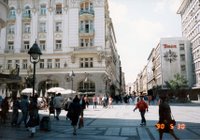
It's been a somewhat hectic week, and I'm sorry I have not been able to post anything since Sunday.
But I have noted the very positive reaction to me being back here - although not in the same way as before.
I spent Wednesday and Thursday in Madrid at a major gathering 15 years after the historic conference on peace in the Middle East. The meeting was supported by the Foreign Ministers of Spain, Norway, Denmark and Sweden and brought together for informal discussions many key decision-shapers from the region.
All in all I flew back from Madrid with a marginally less pessimistic assessment of the situation. Things could easily go very wrong - but there is a slight possibility that we might succeed in turning things around.
In my opening remarks I stressed that time is not necessarily on the side of peace any longer.
There is a risk of not only rising tensions but also the rise of forces that might challenge the very foundations on which peace must be built. So, time is of the essence, and what we need is no longer a peace process - what we need is peace.
Back in Stockholm from Madrid I followed the latest move in the somewhat bizarre efforts to attack my due to the remumeration I received from some of my board positions before becoming Foreign Ministers.
Specifically, it concerned the share options I received as part of the board remumeration from the investment company Vostok Nafta. As appropriate, I sold them as soon as I could, but to some that wasn't enough and they called for all sorts of investigations.
As is usual in this sort of case, there was the usual media frenzy as well. The media hunts in herds.
But earlier today the legal inquiry very solidly rejected all the accusations and attempts to smear me. This was the much stronger as it come from a prosecutor well known for taking the strictest of views on these sorts of issues.
Naturally, this will not stop the political opposition. They have nothing to say about foreign affairs - but smear campaigns they can always mount. I don't think there are too many who will be much impressed by their efforts.
From Stockholm I flew to Vilnius for a very special evening.
Tonight is 16 years since Soviet forces stormed the TV tower in Vilnius in their attempts to smash the forces of freedom and democracy. Thirteen young people lost their lives that night.
I attended the commemorative vigil outside the Parliament building tonight, meet the heroes of those days and was also suddenly invited the address all those that had gathered to remember, to sing the songs and to express their faith in their country.
And tomorrow I will address the special session of Parliament. I will speak about our vision for all of Europe, and the text will be available on the Swedish Ministry for Foreign Affairs web site immediately.
Then I stay here during the day.
I'll see the KGB museum. And I'll see my old friend Emmanual Zingeris to continue discussions on efforts to restore parts of the old ghetto of Vilnius. This was - before the immense tragedy of the Holocaust - the Jerusalem of Eastern Europe, and the contribution that Jews from here have done in many countries has been enormous.
Before flying home I will attend - with the President and the Prime Minister - the special commemorative mass in Vilnius Cathedral.









